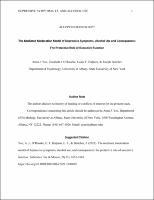Please use this identifier to cite or link to this item:
https://hdl.handle.net/20.500.12202/10123| Title: | The mediated moderation model of depressive symptoms, alcohol use, and consequences: the protective role of executive function |
| Authors: | Halpern, Leslie F. 0000-0002-8212-516X |
| Keywords: | Depression Executive Function -- Evaluation Alcohol Drinking in College -- Evaluation Risk Assessment Students, Undergraduate -- Psychosocial Factors Models, Statistical Signs and Symptoms Behavior Self Report Hardiness heavy episodic drinking alcohol-related consequences emerging adulthood |
| Issue Date: | 2021 |
| Publisher: | Taylor & Francis |
| Citation: | Yeo, A. J., O’Rourke, E. J., Halpern, L. F., & Bettcher, J. (2021). The mediated moderation model of depressive symptoms, alcohol use, and consequences: the protective role of executive function. Substance Use & Misuse, 56(11), 1651-1661. |
| Series/Report no.: | Substance Use & Misuse;56(11) |
| Abstract: | Background: Heavy episodic drinking (HED) and negative drinking consequences represent prevalent and serious health concerns for college students. Depressive symptoms may elevate students' risk for engaging in HED and experiencing negative consequences, but levels of risk may vary by executive function (EF) capabilities. Growing evidence suggests that EF deficits are associated with comorbid depressive symptoms and alcohol misuse. Nevertheless, little is known about unique and shared risks that depressive symptoms and EF may interactively pose for HED and negative drinking consequences. Methods: To address these gaps, the study assessed depressive symptoms, multiple domains of EF via multimethod approach, HED, and negative drinking consequences in a sample of 446 undergraduate students. Mediated moderation models were conducted to examine associations between depressive symptoms and alcohol use behaviors and modulating roles of EF. Results: Depressive symptoms, poor planning, and self-reported executive dysfunction were significantly associated with HED and negative drinking consequences. HED mediated the effect of depressive symptoms and executive dysfunction on negative consequences. A significant interaction indicated that better EF (i.e. low or average self-reported executive dysfunction) may buffer the risk depressive symptoms present for negative drinking consequences. Conclusions: The current findings suggest that among college students, risk and resilience factors for HED and negative drinking consequences may vary. Effective EF capabilities may be especially helpful for reducing students' risk for more serious drinking consequences. |
| Description: | Scholarly article / Open access |
| URI: | https://www.researchgate.net/publication/353272086_The_Mediated_Moderation_Model_of_Depressive_Symptoms_Alcohol_Use_and_Consequences_The_Protective_Role_of_Executive_Function https://hdl.handle.net/20.500.12202/10123 |
| ISSN: | 1082-6084 |
| Appears in Collections: | Ferkauf Graduate School of Psychology: Faculty Publications |
Files in This Item:
| File | Description | Size | Format | |
|---|---|---|---|---|
| Halpern Yeo2021 OA Themediatedmoderationmodel_ACCEPTEDMANUSCRIPT.pdf | 351.2 kB | Adobe PDF |  View/Open |
This item is licensed under a Creative Commons License

